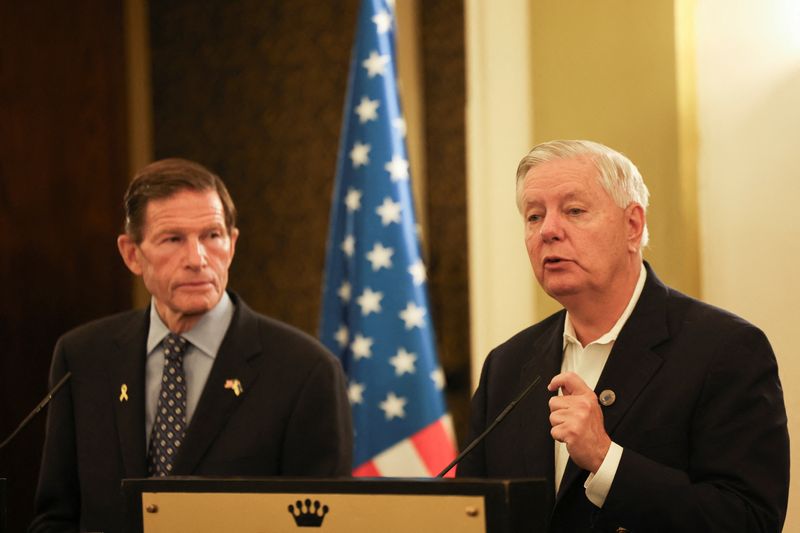By Alexander Cornwell
JERUSALEM (Reuters) – Prominent U.S. Republican Senator Lindsey Graham urged Saudi Arabia and Israel on Tuesday to establish diplomatic ties by the end of the year, warning that the next U.S. administration is unlikely to be able to secure enough votes to support the deal.
The Biden administration is seeking to broker a normalisation accord between the two countries that would include U.S. security guarantees for Gulf state Saudi Arabia, among other bilateral deals between Washington and Riyadh.
“We can get you a treaty through the Senate between the United States and Saudi Arabia, a defense agreement like you have in Japan and Australia, if you do it on President Biden’s watch,” Graham, who is seen as close to Republican presidential candidate Donald Trump, told reporters in Jerusalem.
“The next president will have a very difficult time getting 67 votes,” he said in reference to the two-thirds majority needed in the U.S. Senate for approving a defense treaty.
Democrat Joe Biden’s term as president will end on Jan. 20.
Graham, a longtime senator, is a key Republican in Congress with influence on foreign policy and national security matters.
Graham, who met Israeli Prime Minister Benjamin Netanyahu on Monday, said he would travel to Saudi Arabia to meet de facto ruler Crown Prince Mohammed bin Salman and to the United Arab Emirates for talks with President Sheikh Mohammed bin Zayed Al Nahyan. The UAE established relations with Israel in 2020.
Saudi officials, including Prince Mohammed, have discussed potentially establishing ties with Israel but over the past year insisted that it include at least the pathway to a Palestinian state, a markedly steeper challenge since the Gaza war erupted.
Israeli-Saudi normalisation could open the door to many other Arab and Muslim-majority nations forging ties with Israel, bolstering regional stability, given Riyadh’ sway in the Muslim world as home to Islam’s two holiest sites in Mecca and Media.
TWO-STATE SOLUTION ‘DEAD’
But even before the Oct. 7, 2023 attack on Israel by Gaza’s ruling Hamas militants that triggered the war, Netanyahu’s right-wing government had rejected a “two-state solution” to the conflict with Palestinians.
Graham said the two-state solution – an independent Palestinian state alongside Israel – had been “dead” ever since the cross-border assault by Hamas gunmen, who killed about 1,200 people and took around 250 hostage.
“The Israeli public will not accept a Palestinian state as a result of this barbaric terrorist attack, because it’s rewarding terrorism. I get that,” Graham said, but he added Israel could work with Riyadh, along with the UAE, on the Palestinian file.
Over 41,000 Palestinians in Gaza have been killed in Israel’s devastating retaliatory war against Hamas in the coastal enclave, according to Palestinian health authorities.
Riyadh has repeatedly called for an end to the war and said the two-state solution and regional stability are interdependent.
Netanyahu has said that establishing diplomatic ties with Saudi Arabia would lead to a “historic reconciliation” between Arab states and Israel, and between Islam and Judaism and vowed to pursue an accord.
Israel has diplomatic ties with a few Arab or Muslim-majority states including the UAE, Egypt, Jordan and Morocco.
The two-state solution has also been put further out of reach by the rapid expansion of Jewish settlements in the West Bank, which Israel occupied in a 1967 war and which Palestinians want as the core of a future state along with Gaza.
(Reporting by Alexander Cornwell; editing by Mark Heinrich)


